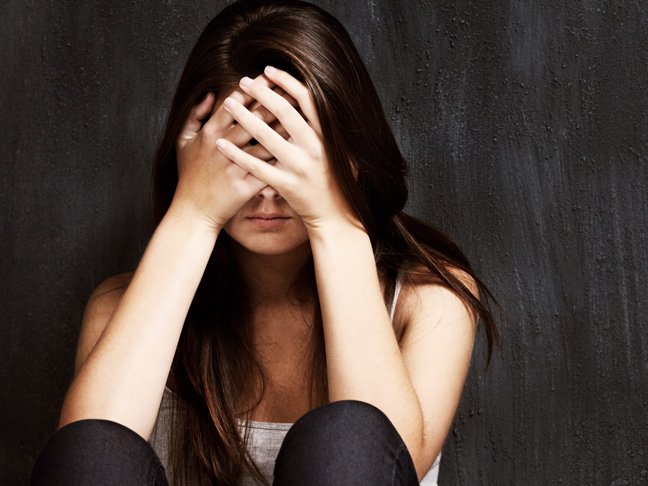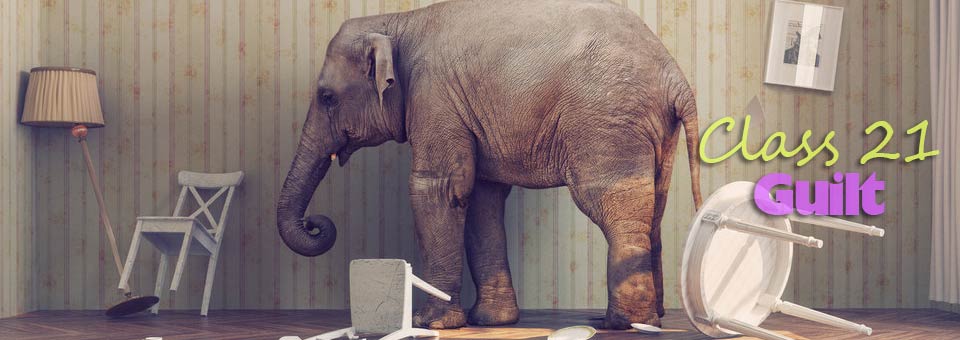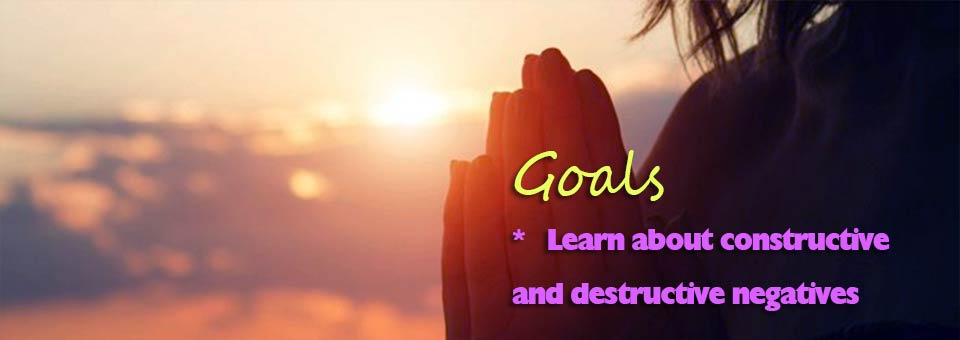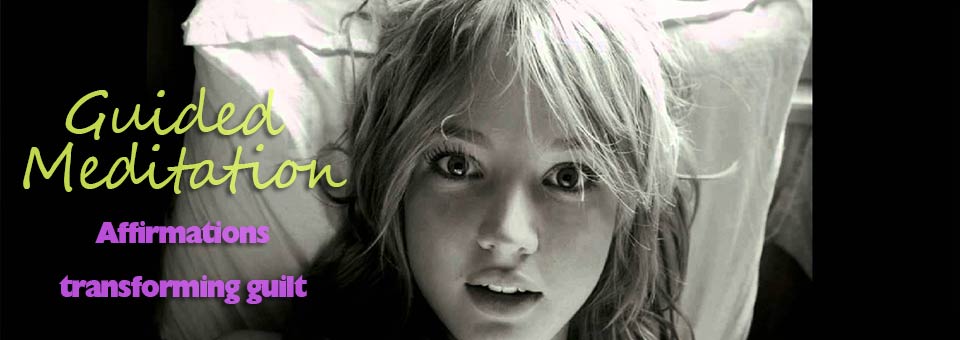In all the
classes so far we have tried to focus on the positives in our lives. We have
concentrated on where we are going not where we have been. This is a potent
method of travelling the fastest in our spiritual lives, and should be the
predominant manner in which we construct our day-to-day practise.
However,
sometimes it is helpful to spend some time recognising possible anchors,
possible negative thought patterns that weigh us down and create
considerable drag in our spiritual journey. Occasionally these patterns are
so ingrained that we do not even recognise them.

They might be qualities
that are entrenched in every one in our family and then, as a consequence,
many of our friends (for we have attracted that type of person to us) and so
it has become almost impossible to recognise in us. Many negative thought
patterns are very, very normal but are in no way natural, let alone
spiritual.
In the next few
classes, we are going to talk about some of these, namely guilt, anger,
fear and more. The
one thing you will notice is that negative qualities are energy black-holes;
they drain us very, very quickly by taxing our attention and focus
and diverting us from the energy-giving divine within us all.
Imagine how much
lighter your journey will be, how much freer and more focussed if you were
able to rid yourself of some of these anchors in your life.
Guilt
I don't believe in guilt, I
believe in living on impulse as long as you never intentionally hurt another
person, and don't judge people in your life. I think you should live
completely free. - Angelina Jolie
Have you ever
been on a diet? Perhaps you tried for a couple of weeks sticking religiously
to your plan but then something happened, perhaps you were tired, or too
busy, or just plain hungry, but for one reason or another you ate something
outside of your diet.
Think about what
happened next.
You felt guilty,
all of the impulses that you had been repressing for the weeks prior
suddenly seemed to have gained their power back and you found yourself
feeling a loser. And you punished yourself, perhaps by eating some more,
maybe thinking something like ‘I will never succeed at this’, ‘diets never
work for me, only for other people’. You criticised yourself over and over
again, until you convinced yourself that the diet would never work for you.
Can you stop and
reflect for a moment on what was happening?
When we feel guilt we
also feel we want to punish ourselves.
We criticise ourselves,
lowering our self-esteem, making it more and more difficult to love
ourselves and therefore anyone else.
We then repeat the thought pattern until it becomes a habit and then our identity.
At this point, guilt has become shame.
Guilt says you did something but it may not have been your identity.
Shame says it is you, you are bad.

Reflect for a moment on about your internal dialog or even dialog you are getting from others, or even the words you are offering others. Is it guilt or shame? Guilt is much easier to
deal with as it was just a momentary lapse that caused you to do something guiltworthy but you are not that person. Shame says you are that person.
Think about class 5 for
a moment and notice also that our potential to make a change is
decreased and therefore we will most likely find ourselves unable to
perform another action (e.g. continue the diet) and therefore the result
will be the change won’t be affected.
Imagine if after
breaking our diet we used some of the techniques we learned in Class 5 and
instead of beating ourselves up, feeling guilty etc we just very quickly
said to ourselves – “Well that was one little hiccup after 2 weeks of
really, really good work – let me focus on how well I am doing, how well I
am feeling, the weight I am losing and how great I am going to feel after
reaching my goal-weight.”
Do you see how we have actually increased our
potential to perform another action?

Guilt for being rich, and guilt
thinking that perhaps love and peace isn't enough and you have to go and get
shot or something.- John Lennon
We can
call this ‘constructive guilt’. And you are going to find that every
negative quality always has a constructive as well as a
destructive dimension, otherwise they would serve absolutely no purpose.
Guilt’s highest purpose is to inspire us to the highest view of ourselves
and it is up to us to make sure we perform the constructive action it is
extolling us to take up.
So this is
another important part of this process, it is not for us to repress anything
including guilt. We need to find its message, find what we are feeling
guilty about. Many times when we repress our guilt, swallow it down, it
becomes a sort of inner sore, it literally makes us sick from the inside out
and obviously in time will translate to a mental or physical sickness.
This
is especially true if we feel helpless to do anything about our guilt. We
feel trapped and powerless to rid ourselves of its web.
If this negative
pattern has no vent or natural way of expression, then the consequences will
be dire, perhaps depression or more serious sicknesses for that energy will
be going round and round inside of us, depleting everything around it.
(Remember it can be a black hole)
Alas! it is a fearful thing. To
feel another’s guilt! - Oscar Wilde
Let’s make our
guilt constructive, by naming it – ‘What am I feeling guilty about?” and
then identifying its message. “
Thank you for reminding me, my guilt friend,
that I am on a diet and this indulgence is not part of our plan for our
highest self, I will act immediately and with decisiveness to choose to eat
properly
again!”
You see the
amazing thing is that guilt is everywhere with most of it the 'destructive'
rather than the 'constructive' kind.
We feel guilty about the way we treat our
parents or the way we treat our kids, or we feel guilty about not doing more
for the homeless or the poor, or we feel guilty that we did not meditate
properly this morning. Much of it is repeated until it is a habit, then our identity. Shame.
The most profound for us as spiritual people is the
guilt that we are not being all we can be. That we are not trying hard
enough or ‘living our dream’.
Conscious virtue is the only solid
foundation of all happiness; for riches, power, rank, or whatever, in the
common acceptation of the word, is supposed to constitute happiness, will
never quiet, much less cure, the inward pangs of guilt. - Philip Dormer
Stanhope, 4th Earl Chesterfield
But if we go
through the process of naming it – “I often feel guilty because I feel I
should be meditating more or reading more spiritual books, or going to the
meditation course (e.g. meditation.org.au ?!).”
Spend a moment identifying
the message and then “Thank you my guilt friend for reminding me and trying
to inspire me to the highest spiritual vision of myself, I am ready to
change, I am ready to perform the action you are extolling me to. You can
rest now, your work is done!”
In this way
there is no place for destructive guilt rather we are using the energy that
would normally be taken by the destructive guilt and redirecting to a
constructive spiritual action. Do you see how powerful this is?
Please reflect
upon the nature of the earth – it is a place for us to progress, a kind of
spiritual school. So the very theme, the motto of the planet, is for us to
change, to progress (remember that you can’t progress without change).

The
natural flow is for us to continually change, to continually progress; guilt
is just one of the earth’s tools for inspiring us. But you must be
aware that these 'negative' tools are one of the last resorts for our inner
school. When we are not paying attention to our positives - the inner
messages, our intuition, our dreams, synchronicity etc than the so-called
'negatives' must be used.
Food, love, career, and mothers,
the four major guilt groups.- Cathy Guisewite
Conquering
destructive thought patterns can be done very powerfully with affirmations.
They are a kind of a training drill that transforms destructive into
constructive. For example, a really good affirmation for guilt might be
something like
–There is no
place in my life for destructive guilt and the extra energy I get I am going
to use to effortlessly, lovingly and joyously change and progress.”
Or simply –Thanks guilt, time for change. I love me”
We’ll try that
in our meditation exercise available for free download below, but you may want to compose your own. Try
recording it for yourself and play it over and over again during the day,
you’ll be amazed at the effect it will have on your life.





